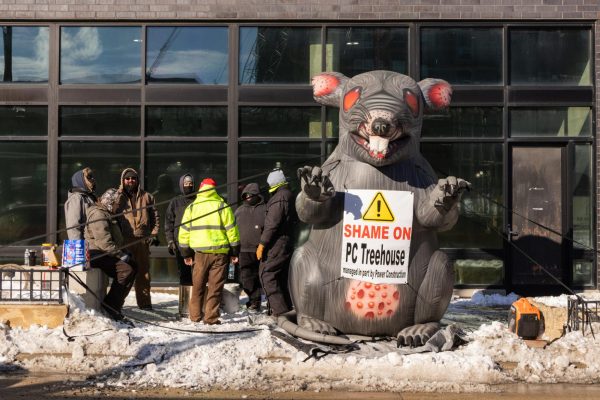Community Learning Lab provides service learning network
Nov 6, 2014
The Community Learning Lab has connected nearly 100 local agencies to hundreds of University students.
“The students at the U of I have put in over 5,000 hours through this (program) into the community,” said Sherrie Faulkner, director of the Community Learning Lab and director of Bachelors of Social Work Field Education. “That’s powerful. We’re really making a difference.”
The Community Learning Lab, or CLL, is an endeavor of the School of Social Work, though its scope of influence also reaches into other departments such as the College of Business and the department of statistics.
Since the beginning, the purpose of the CLL has been to link students with community organizations and agencies outside of the classroom. It serves as a liaison among the students, professors and local community groups such as the Crisis Nursery, Don Moyer’s Boys and Girls Club, the American Red Cross and the Savoy Fire Department, among several others.
“It (is) an opportunity to match classroom assignments to real life, hands-on experiences,” Faulkner said.
Get The Daily Illini in your inbox!
Students outside of the participating classes and community members can also join the CLL’s efforts on their own time.
The CLL began in 2012 as a pilot program and then became full-fledged in the fall of 2013 with funding from the University’s Office of Public Engagement grant. This semester, the CLL still receives the grant money, with additional financial support through the Dean of the College of Social Work, Faulkner said. The funding goes toward “a student and an academic hourly liaison to help build and run the program” along with training and marketing, Faulkner said.
The projects, in collaboration with the CLL, range from one-time service opportunities or interviews to projects lasting a full semester or more.
Joy Sugihara, senior in Social Work, is currently participating in a service learning opportunity in her SOCW 461 course, Professional Practice Seminar 1. The CLL collaborated with Sugihara and her class partner, Haley Fox, senior in Social Work, to place them with the Multicultural Community Center in Rantoul, one of Sugihara’s top three agency choices.
“Our project is researching different grants or resource opportunities for the agency to build their existing computer lab and library,” she said. “They mainly serve migrant families … or part-time workers from Mexico, and they serve the parents and also the children through academic after school programs.”
The semester-long project and community collaboration will prepare Sugihara for next semester’s social work internship course, SOCW 470.
Because the Multicultural Center is in Rantoul, Sugihara and Fox drive there every two weeks and conduct research on campus in between visits. Other students in her class work with agencies based on campus and typically meet with them on a weekly basis.
“For me I think it’s a way to have hands-on experience,” Sugihara said. “You learn about not only the reality of the work, but also how there’s just a lot of variety and diversity of supervisors — so the leadership styles, what they’re passionate about and a lot of communication skills.”
She said that it’s an entirely different experience from simply reading and writing in a classroom setting.
“Overall it’s just a learning experience that’s beneficial to the future work that we’re going to do,” Sugihara said.
Morgan Tarter, graduate student in Social Work, has participated extensively with the CLL. In fact, she serves as the CLL student liaison in their office.
“I’ve been with Sherrie (Faulkner) in the Community Learning Lab almost every single semester since it started,” Tarter said. “So I got to see how it’s grown — and it has; it kind of just took off. It has expanded.”
She said that the CLL can be an essential resource to University students who are not as familiar with the variety of agencies and organizations in the area. It serves as a positive connection for social work classes, business classes and other courses that focus on community service learning projects.
This “liaison relationship” connection, Faulkner emphasized, is “vital” to forming new networks that would have otherwise gone unchecked between the campus and the community.
Tarter is currently working on a needs assessment for a pastoral care department in Carle Foundation Hospital, from which she can see actual results and share them with her supervisors.
“To be able to help (local organizations) as a student, that only makes you marketable in your future,” she said. “It’s a really great thing for students to be able to say that they’ve actually completed these very tangible things, but also to give that back to an agency.”
Reema can be reached at abiakar2@dailyillini.com.





